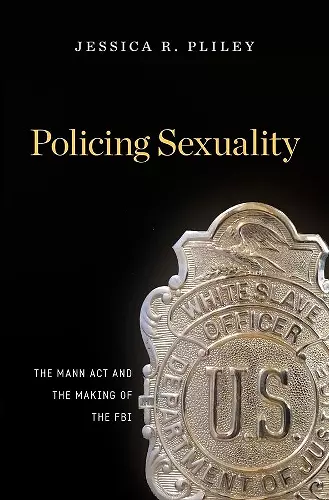Policing Sexuality
The Mann Act and the Making of the FBI
Format:Hardback
Publisher:Harvard University Press
Published:3rd Nov '14
Currently unavailable, and unfortunately no date known when it will be back

America’s first anti–sex trafficking law, the 1910 Mann Act, made it illegal to transport women over state lines for prostitution “or any other immoral purpose.” It was meant to protect women and girls from being seduced or sold into sexual slavery. But, as Jessica Pliley illustrates, its enforcement resulted more often in the policing of women’s sexual behavior, reflecting conservative attitudes toward women’s roles at home and their movements in public. By citing its mandate to halt illicit sexuality, the fledgling Bureau of Investigation gained entry not only into brothels but also into private bedrooms and justified its own expansion.
Policing Sexuality links the crusade against sex trafficking to the rapid growth of the Bureau from a few dozen agents at the time of the Mann Act into a formidable law enforcement organization that cooperated with state and municipal authorities across the nation. In pursuit of offenders, the Bureau often intervened in domestic squabbles on behalf of men intent on monitoring their wives and daughters. Working prostitutes were imprisoned at dramatically increased rates, while their male clients were seldom prosecuted.
In upholding the Mann Act, the FBI reinforced sexually conservative views of the chaste woman and the respectable husband and father. It built its national power and prestige by expanding its legal authority to police Americans’ sexuality and by marginalizing the very women it was charged to protect.
Policing Sexuality…is an insightful document about the history of government surveillance and control of sex and sexuality in the United States… Pliley’s intriguing and easy to read book is a brilliant resource for historians, researchers in the field of gender and sexuality and anyone who is interested in the legal and historical aspects of sex trafficking and state policies. -- Nafiseh Sharifi * LSE Review of Books *
The White-Slave Traffic Act, commonly known as the Mann Act, was passed in the United States in 1910 and made it a felony to transport any ‘woman or girl for the purpose of prostitution or debauchery, or for any other immoral purpose’ across state lines. It was designed to fight a perceived growth of prostitution, especially the trafficking in of women from Europe to America. Pliley, drawing largely from the records of the Bureau of Immigration, Bureau of Investigation, and then Federal Bureau of Investigation (FBI), examines the way these agencies used the expansion of their powers less to protect women and more to control sexuality according to their own conservative culture. Using case files, Pliley shows how ideas about women’s sexuality and the vagueness of the phrase ‘any immoral purpose’ were used to police sexual and moral boundaries. She illustrates how the law was more often employed by the FBI before World War II to prosecute unapproved premarital, extramarital, and interracial sexual relationships, than to prosecute human trafficking… A valuable contribution for those curious about the history of women, gender, and sexuality, as well as those interested in the role of policing and the FBI in the cultural and political history of the U.S. in the 20th century. -- Jessica Moran * Library Journal *
A brilliant, counterintuitive history of the FBI that takes women from the margins—party girls and runaways, adventurers and adulterers, hardened hustlers and delinquent daughters—and shows how they were central to the rise of federal power in America. Written in crystal clear, jargon-free prose, and brimming with important insights, Policing Sexuality is a major contribution to the histories of sexuality and government surveillance, and will be required reading for anyone interested in the sex trade, past, present, or future. -- Debby Applegate, Pulitzer Prize–winning author of The Most Famous Man in America
A fascinating, first-rate study. Using a remarkable trove of documents in the Bureau of Investigation’s white slavery files, Pliley resurrects a lost history of conflicts over gender, sexuality, masculinity, disease, and deviance in the early twentieth-century United States. -- Beverly Gage, author of The Day Wall Street Exploded
- Nominated for Littleton-Griswold Prize 2015
- Nominated for Joan Kelly Memorial Prize in Women's History 2015
- Nominated for Berkshire Conference of Women Historians First Book Prize 2014
- Nominated for James Willard Hurst Prize 2015
- Nominated for Henry Adams Prize 2015
ISBN: 9780674368118
Dimensions: unknown
Weight: unknown
304 pages